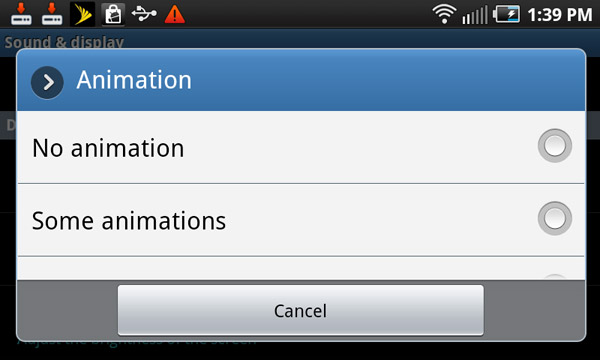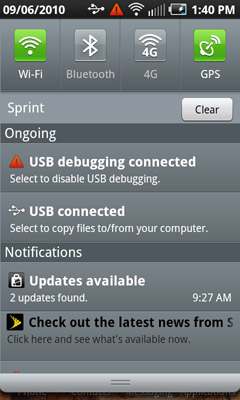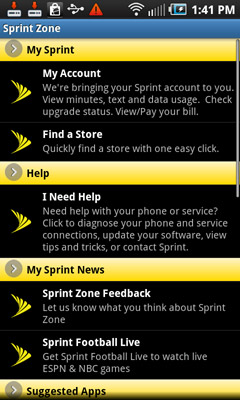Samsung Epic 4G Review: The Fastest Android Phone
by Anand Lal Shimpi on September 6, 2010 5:28 PM EST- Posted in
- Smartphones
- Samsung
- Epic 4G
- Gadgets
- Mobile
The Smoothest Android UI To Date
I’ve tried the big names. The G1, Droid X, HTC Incredible, EVO 4G, and even newcomers like the Dell Streak. The one thing all Android phones I’ve laid my hands on have in common is varying degrees of a choppy UI. Some are worse than others but they all exhibited it. The choppiness is really apparent when compared to the iPhone. Scrolling through apps, or down web pages would just feel choppy - as if we weren’t running at a smooth or constant frame rate. I had no idea if it was an Android thing, a driver issue or something else entirely. The fact that it varied so much depending on hardware/software meant that there was no easy solution.
For example, the HTC Incredible got pretty close simply by ditching a number of animations. In fact, there’s even a setting within Android to do this:

The Galaxy S did it the old fashioned way though: a lot of software tuning and faster hardware.
Tap the icon in the lower right corner to bring up a list of applications and swiping through them feels just like an iOS device. It’s smooth. There are occasional dropped frames but it’s rare. Scrolling down web pages is still choppy though.
Remember me talking about Samsung learning from Apple? These are the learnings. Even the app list in Samsung’s custom TouchWiz Android UI mimics iOS. You get pages of apps that you flip through left-to-right, there’s no vertical scrolling.

You still get multiple home screens, but swiping between them is fairly smooth as well. Occasionally I’ll get a hiccup or two but overall, it’s the best I’ve seen on an Android phone.
Samsung clearly put a lot of attention to making this aspect of the Epic 4G as Apple-like as possible, and I believe it delivered. I’d say you get around 90 - 95% of the scrolling feel of the iPhone 4, which is to say that it’s close enough.
The polish extends beyond the smoothness of the UI. Individual apps feel more appliance like and less PC like. The dialer UI is very clean and does sensible things like automatically look up phone numbers in your contact list as you dial them in - this applies to both number matching as well as T9-like text matching. The camera app hides unused customization options unless you ask to see them. Samsung modified the notifications pulldown to include a widget that lets you enabled disable WiFi, 4G, Bluetooth and GPS. It’s the little things like these that really make Samsung’s TouchWiz UI a friendlier face on Android.

There’s a fine line between polish and oversimplification however, and in some areas Samsung does cross it. Samsung’s custom Android UI does things like removes all ability to see percentage of battery life remaining, all you get is a visual indication but nothing more. Even going into the Android battery info menu you can’t get that level of detail, you’ll have to turn to a third party app.
Samsung also removed all support for recording call length in your call log. On other Android phones you have a record of how long each phone call lasted, but Samsung removed it entirely. It keeps the UI ultra clean, but at the expense of functionality.

Sprint does its unnecessary evil and equips the Epic 4G with Sprint spam right out of the box. You'll occasionally get a Sprint icon in the notification bar telilng you about the latest news from Sprint. Tapping on it will bring you to the Sprint Zone (pictured above).

The Epic 4G’s icons are all custom designed and they all feel very modern and web-2.0-ey. You get bold colors and big boxes around each icon that make the app launcher feel like a grown up toy rather than a PC OS shrunk into a smartphone. The downside is that the individual app icons aren’t very memorable or distinguishable from one another. Colors are great for organization, but too many and you lose all semblance of order.
Ultimately if you’re trying to give someone a more iOS-like experience on an Android phone, Samsung gets the job done. Its custom skinning is the closest you can get to iOS without giving up the flexibility of Android.










93 Comments
View All Comments
medi01 - Tuesday, September 7, 2010 - link
Java's JIT could create code that is faster than C/C++. Because unlike C++ compiler, it also has runtime info about executables, it could know for sure, which of the if branches is more likely to be true, for instance.The only part of Java that was much slower than C++ was (and I think still is) sin/cos related functions. Since Sun had to guarantee "runs anywhere" with the exactly the same results, instead of using CPU's features they "manually" calculate it.
Voo - Tuesday, September 7, 2010 - link
Well java WAS slow - around ten years ago, but people have already made up their mind, it's hard to get new ideas into some heads. Though the lack of a JIT in dalvik hampered performance, but that's hardly something where you can blame the language for..Ah, just like all those people who still believe that manual memory managment is inherently faster than GC..
medi01 - Tuesday, September 7, 2010 - link
Java is not inherently slower than C++, but it does need more memory.The problem with Androids up to 2.2 was Dalvik VM that had no JIT.
designerfx - Tuesday, September 7, 2010 - link
what a brilliant troll, or accidental. I'm not sure, but plenty of debunked this.What really brings down the entire samsung line of phones is that the GPS is horrible. I have one myself, and have the same issue on the vibrant as on the epic. Samsung really screwed the GPS up bigtime.
lwatcdr - Tuesday, September 7, 2010 - link
Well when faced with such a brilliant technical argument like "but Java sucks. Big time" what can one say.http://www.cnn.com/2004/TECH/space/01/16/space.mar...
Is an article from back in 2004 about how those idiots at NASA used Java to control the Spirit rover on Mars.
If only they had you available to show them how to do right.
Man I get sick of this crap. I heard the same thing way back when. People complaining when programmers used high level languages to write programs instead of assembly.
The thing is that it was all silliness just as it is now.
What really counts isn't the language but the programmer using it.
Android's speed issues tend to because by.
1. Not using the GPU for the UI
2. Using multitasking from the start.
IOS has only just now gotten official multitasking and even that is limited.
But really just drop the
Iksy - Tuesday, September 7, 2010 - link
Umm... to be clear, this is just the user interface used on Earth, which is something Java does well. The rovers themseves are controlled using VxWorks RTOS. VxWorks itself is written in C or C++ I believe.Ethaniel - Tuesday, September 7, 2010 - link
Well, it's not the kind of technical argument everyone would like, but it gets to the point. Anand reviewed like half a dozen of Android phones, all with the same problem. So, or the companies are making exactly the same mistake with each and every model they launch, or Java is to blame. And no, I'm not trolling because I do want to Android to succeed. A troll is based on hate, and it usually doesn't check back the thread he/she started. And you haven't seen a single insult in this thread, right? ;)ktwebb - Monday, September 6, 2010 - link
Sounds like an IPhone Fanboy that is trying his best to be subjective. Samsung actually did not get it right performance wise. They use an antiquated and slow file system. For a pleasurable UI experience on Android, the N1 is still king, especially on 2.2. The only way the samsung galaxy variants fly is with root access and ext2, 3 or 4 fixes. there are GPS fixes as well however where Samsung let down actually is in the UI with Touchwiz and their ridiculous homage to Apple. No wonder this twit liked it. Android people IMMEDIATELY change the launcher. Anyway, the Hardware on the Galaxy S is excellent. Samsung did their best to eff it up and only with tweaks and root level access is it a really strong phone. Google and Androids main problem is OS sprawl and fragmentation. They get that cleaned up and the IPhone 4 is a distant second mobile OS. Right now, with the clear advantages Android phones have, specifically customization and an open source community among others, it's essentially a wash. It's about what you prefer and are comfortable with. I'm an Android guy because I like to make my phone do what I want it to, not what Jobs wants my phone to be.StealthX32 - Monday, September 6, 2010 - link
ktwebb, I don't think Anand reviewed it w/ the ext2 FS hack/fix (whatever you want to call it). The UI speed is fine from the factory; it's much better than the EVO 4G (even with Froyo) and on par w/ the N1, just not as good as it *could* be once you root it and fix the filesystem.ktwebb - Tuesday, September 7, 2010 - link
N1 Froyo is faster than stock Galaxy S Variants. And yeah, he didn't review with hacks and I certainly understand why he wouldn't. Shouldn't need them. But that is a Samsung issue, not Android. Samsung has the potential for a very good handset with the Galaxy S. They are trying their best to eff it up though. I haven't played with the EVO but had android phones since the G1 inception. The N1 was the best UI experience after Froyo was pushed. And far better than any IPHone I've used, although my experience with 4 is limited.